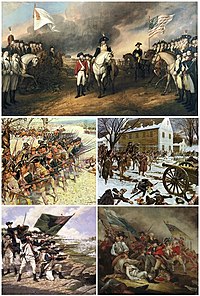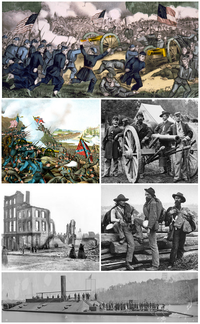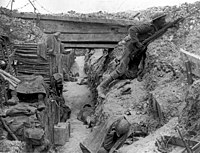-
Use Cases
-
Resources
-
Pricing
Founding and Early History
Boston Tea Party
Dec 16, 1773
% complete
The Boston Tea Party was a protest by American colonists against British taxation policies. Disguised as Native Americans, colonists boarded British ships and dumped chests of tea into the Boston Harbor, leading to increased tensions between the colonies and Britain.
Image source: Boston Tea Party

American Revolutionary War
Apr 19, 1775 - Sep 3, 1783
% complete
The American Revolutionary War was fought between the American colonies and Great Britain. It resulted in the establishment of the United States as an independent nation.
Image source: American Revolutionary War

Declaration of Independence
Jul 4, 1776
% complete
The Declaration of Independence, drafted by Thomas Jefferson, proclaimed the thirteen American colonies' separation from Great Britain and their formation as a new nation, the United States of America.
Image source: United States Declaration of Independence

Expansion and Civil War
Louisiana Purchase
Apr 30, 1803
% complete
The Louisiana Purchase was a land deal between the United States and France, doubling the size of the country and opening up vast territories for westward expansion.
Image source: Louisiana Purchase

Lewis and Clark Expedition
May 14, 1804 - Sep 23, 1806
% complete
The Lewis and Clark Expedition, led by Meriwether Lewis and William Clark, explored the newly acquired western territories, mapping the path to the Pacific Ocean and gathering valuable scientific and geographic information.
Image source: Lewis and Clark Expedition

Missouri Compromise
Mar 3, 1820
% complete
The Missouri Compromise was a legislative agreement that admitted Missouri as a slave state and Maine as a free state, aiming to maintain a balance between slave and free states in the Union.
Image source: Missouri Compromise

Mexican-American War
Apr 25, 1846 - Feb 2, 1848
% complete
The Mexican-American War was a conflict between the United States and Mexico, resulting in the acquisition of vast territories in the Southwest, including California, Arizona, New Mexico, Nevada, Utah, and parts of Colorado and Wyoming.
Image source: Mexican–American War

Emancipation Proclamation
Jan 1, 1863
% complete
The Emancipation Proclamation, issued by President Abraham Lincoln, declared that all slaves in Confederate territory were to be set free, marking a significant turning point in the fight against slavery during the Civil War.
Image source: Emancipation Proclamation

Reconstruction Era
Apr 9, 1865 - Mar 31, 1877
% complete
The Reconstruction Era followed the Civil War and aimed to rebuild the South, provide civil rights to freed slaves, and reintegrate Confederate states into the Union.
Image source: Reconstruction era

Transcontinental Railroad Completion
May 10, 1869
% complete
The completion of the First Transcontinental Railroad, connecting the eastern and western coasts of the United States, revolutionized transportation and facilitated westward expansion.
Image source: First transcontinental railroad

Industrialization and Progressive Era
Women's Suffrage Movement
Jul 19, 1848 - Aug 26, 1920
% complete
The Women's Suffrage Movement fought for women's right to vote, culminating in the ratification of the 19th Amendment to the United States Constitution.
Image source: Women's suffrage in the United States

Civil War
Apr 12, 1861 - Apr 9, 1865
% complete
The Civil War was a conflict between the Northern states (Union) and the Southern states (Confederacy) over issues of slavery and states' rights, resulting in the preservation of the Union and the abolition of slavery.
Image source: American Civil War

Spanish-American War
Apr 25, 1898 - Aug 12, 1898
% complete
The Spanish-American War was a brief conflict between the United States and Spain, resulting in the acquisition of territories such as Puerto Rico, Guam, and the Philippines, establishing the United States as a global power.
Image source: Spanish–American War

World War I
Jul 28, 1914 - Nov 11, 1918
% complete
World War I was a global conflict involving many nations, including the United States. It marked a shift in global power dynamics and led to significant social and political changes domestically.
Image source: World War I

Modern America
Great Depression
Oct 29, 1929 - Mar 3, 1933
% complete
The Great Depression was a severe economic downturn that began with the stock market crash of 1929, leading to widespread unemployment, poverty, and social upheaval.
Image source: Great Depression

World War II
Sep 1, 1939 - Sep 2, 1945
% complete
World War II was a global conflict involving many nations, including the United States. It had a profound impact on American society, leading to economic growth, technological advancements, and the emergence of the United States as a superpower.
Image source: World War II

Civil Rights Act of 1964
Jul 2, 1964
% complete
The Civil Rights Act of 1964 outlawed racial segregation and discrimination, prohibiting discrimination based on race, color, religion, sex, or national origin, and was a significant milestone in the struggle for civil rights.
Image source: Civil Rights Act of 1964

Key Facts
- 1492: Columbus arrives in the Americas
- 1776: Declaration of Independence is signed
- 1861-1865: American Civil War
- 1929: Stock Market crash triggers the Great Depression
- 1969: Neil Armstrong becomes the first person to walk on the moon
Source
This US History timeline was generated with the help of AI using information found on the internet.
We strive to make these timelines as accurate as possible, but occasionally inaccurates slip in. If you notice anything amiss, let us know at [email protected] and we'll correct it for future visitors.
Create a timeline like this one for free
Preceden lets you create stunning timelines using AI or manually.
Customize your timeline with one of our low-cost paid plans
Export your timeline, add your own events, edit or remove AI-generated events, and much more
Free
$
0
free forever
No credit card required.
Basic
$
10
/month
billed annually
Cancel anytime.
Pro
$
16
/month
billed annually
Cancel anytime.
Common Questions
Can I cancel anytime?
Yes. You can cancel your subscription from your account page at anytime which will ensure you are not charged again. If you cancel you can still access your subscription for the full time period you paid for.
Will you send an annual renewal reminder?
Yes, we will email you a reminder prior to the annual renewal and will also email you a receipt.
Do you offer refunds?
Yes. You can email us within 15 days of any payment and we will issue you a full refund.
What if I have more questions?
Check out our pricing docs or send us an email anytime: [email protected].